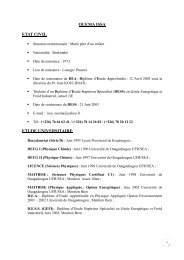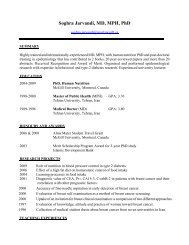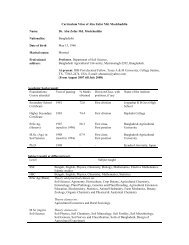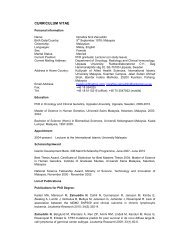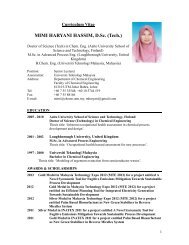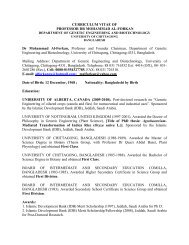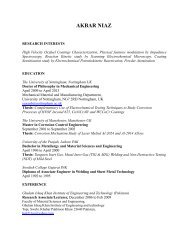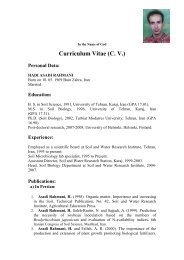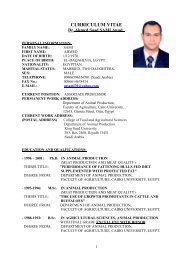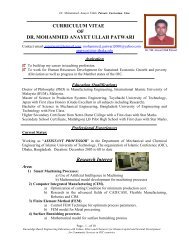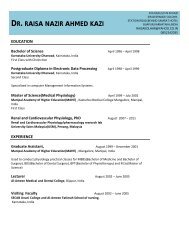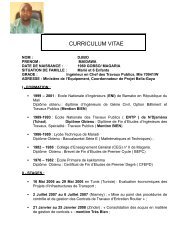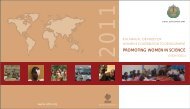Engineering: issues, challenges and opportunities for development ...
Engineering: issues, challenges and opportunities for development ...
Engineering: issues, challenges and opportunities for development ...
Create successful ePaper yourself
Turn your PDF publications into a flip-book with our unique Google optimized e-Paper software.
ENGINEERING: ISSUES CHALLENGES AND OPPORTUNITIES FOR DEVELOPMENTThe role of SEFIThe main engineering education organizations in Europeare the ‘European Society <strong>for</strong> <strong>Engineering</strong> Education’ (SEFI)<strong>and</strong> the ‘International Society of <strong>Engineering</strong> Education’(IGIP). Both were founded during the 1970s.SEFI promotes cooperation between higher engineeringeducation institutions <strong>and</strong> other scientific <strong>and</strong> internationalbodies on <strong>issues</strong> of research <strong>and</strong> <strong>development</strong> inengineering education. For instance, it participates in Europeannetwork projects such as the SOCRATES ThematicNetwork ‘Teaching <strong>and</strong> Research in <strong>Engineering</strong> Educationin Europe’ (TREE). SEFI is also engaged in policy <strong>development</strong>regarding engineering education, <strong>and</strong> publishingstatements regarding <strong>issues</strong> like the Bologna Process(Graaff <strong>and</strong> Borri, 2006).* Focusing on the importance ofsustaining ideals <strong>and</strong> claims with scientific research, a newSEFI working group on engineering education research wasestablished in 2008.By creating networks allowing people all over Europe tolearn from each other in working groups <strong>and</strong> to shareinsights at conferences <strong>and</strong> seminars, both SEFI <strong>and</strong> IGIPhave contributed significantly to the <strong>development</strong> <strong>and</strong>research of engineering education. As participants aremostly staff from the engineering schools, the level ofresearch has been mostly practice-oriented case studies<strong>and</strong> curriculum <strong>development</strong> projects. The European Journalof <strong>Engineering</strong> Education (EJEE) – the official ScientificJournal of SEFI – is the plat<strong>for</strong>m <strong>for</strong> contributions with awider scope.* Graaff, E de, <strong>and</strong> Borri, C. 2006. Research <strong>and</strong> Innovation of<strong>Engineering</strong> Education in Europe the contribution of SEFI. In:Proceedings of the 2006 JSEE Annual Conference, pp. 12–17.– Research van het Wetenschappelijke Onderwijs) during the1970s (van Kemenade, 1976). 69 During the 1980s, research onhigher education was flourishing. The budgets increased <strong>and</strong>the RWO institutes were allowed to recruit more <strong>and</strong> moreresearchers. The various educational centres joined <strong>for</strong>ces in anin<strong>for</strong>mal network of Centres <strong>for</strong> Research on Higher Education(CRWO). 70 A national network <strong>for</strong>med, including both generaluniversities as well as universities of technology.The CRWO network continued to organize study conferences(Bartelds et al., 1987). 71 Also a Higher Education section wasestablished as a thematic group operating within the nationalframework of educational researchers. By the time of thefourth national convention on Research in Higher Educationin 1981 research institutes were established at or in close relationto most universities.In the years to come a problem surfaced that threatenedthe existence of the RWO institutes almost everywhere: thecommunication between the educational researchers, theadministrators <strong>and</strong> the teaching staff was often ineffective.This may be explained in part because the researchers tendedto become more <strong>and</strong> more involved in their own theories,<strong>and</strong> in part because the teachers did not apply the samesound scientific methods they used <strong>for</strong> their own professionalfield to their teaching tasks (Van der Vleuten, 1997). 72 As aconsequence, the RWO institutes went through recurringcycles of growing <strong>and</strong> shrinking. Overlooking this process inhindsight, it can be observed that universities with a strongeducational research group (like <strong>for</strong> instance Maastricht69 Vroeijensteijn, A. (red.) 1981. Kwaliteitsverbetering Hoger Onderwijs [Improvement ofquality in Higher Education]. Proceedings of the fourth national convention Researchin Higher Education, December 1-180-1981. Eindhoven: Stichting Nationaal Congres/1981.70 For more in<strong>for</strong>mation: http://www.crwo.nl71 Bartelds, J, K. Brants, W. Gerritsen van der Hoop, M. Hulshof <strong>and</strong> M. van der Weiden(eds.) 1987. Studiedag Contactgroep Research Wetenschappelijk Onderwijs [Study ConferenceContact Group Research Higher Education] Nijmegen/Utrecht: IOWO/VSNU.72 Vleuten, C. P.M. van der. 1997. De intuïtie voorbij [Beyond intuition] Tijdschrift voorHoger Onderwijs, 15.1. pp. 34-46.University) invariably tend to get high ratings in polls thatassessed satisfaction with the educational climate (De Graaff<strong>and</strong> Sjoer, 2006). 73<strong>Engineering</strong> education: the role of SEFIThe researchers at the research <strong>and</strong> <strong>development</strong> centres weresocial scientists applying their sociological, psychological <strong>and</strong>pedagogical research methods to the field of higher education.They contributed to the <strong>development</strong> of the educationalsciences discipline. However, the more sophisticated theresearch became, the further they drifted away from theconcerns of the teachers in the classroom. Teachers felt aneed to share experience <strong>and</strong> to collaborate with others in thesame position. <strong>Engineering</strong> is one of the fields were this desireresulted in the establishment of societies of professionals.The future of engineering education research in EuropeIn Europe higher education is a national affair. That means thatthe EU cannot take political initiatives at this level withoutthe consent of all Member States. The Bologna Process is anexample of a successful initiative. It has brought about manychanges in the engineering education in Europe at a structurallevel adjusting programs to the length of Bachelor, Master <strong>and</strong>PhD studies (3+2+3 years), <strong>and</strong> this is an important step <strong>for</strong>ward<strong>for</strong> mobility <strong>and</strong> international degree programs.The emergence of the ‘knowledge society’ entails fundamentalchanges in the processes of teaching <strong>and</strong> learning. Objectivesare set to keep increasing the numbers of students in highereducation <strong>and</strong>, as a consequence, learning will have to beorganized in a completely different manner. The rapid <strong>development</strong>of electronic learning technologies provides the meansto deal effectively with large numbers of students. However,teachers in higher education will have to re-learn their profession:instead of being experts teaching on their own specialism,they will have to learn to manage a learning process from adistance <strong>and</strong> to collaborate with other experts in the design of73 Graaff, E. de <strong>and</strong> Sjoer, E. 2006. Positioning Educational Consultancy <strong>and</strong> Research in<strong>Engineering</strong> Education. In: Proceedings of the 34th SEFI Annual Conference, Uppsala:Uppsala University, pp. 98–101.348



